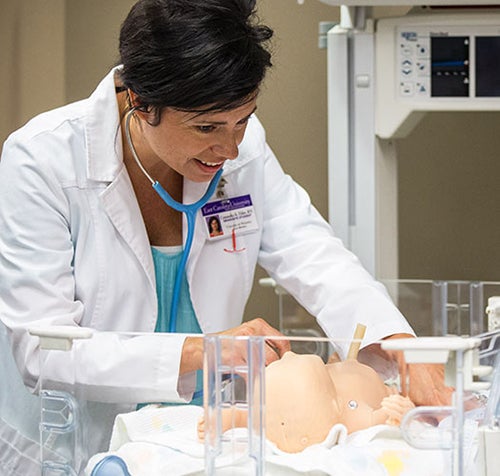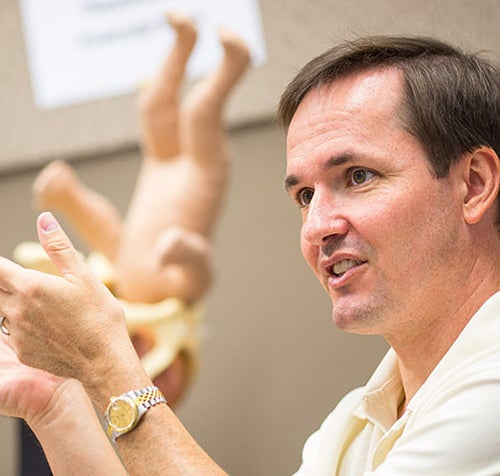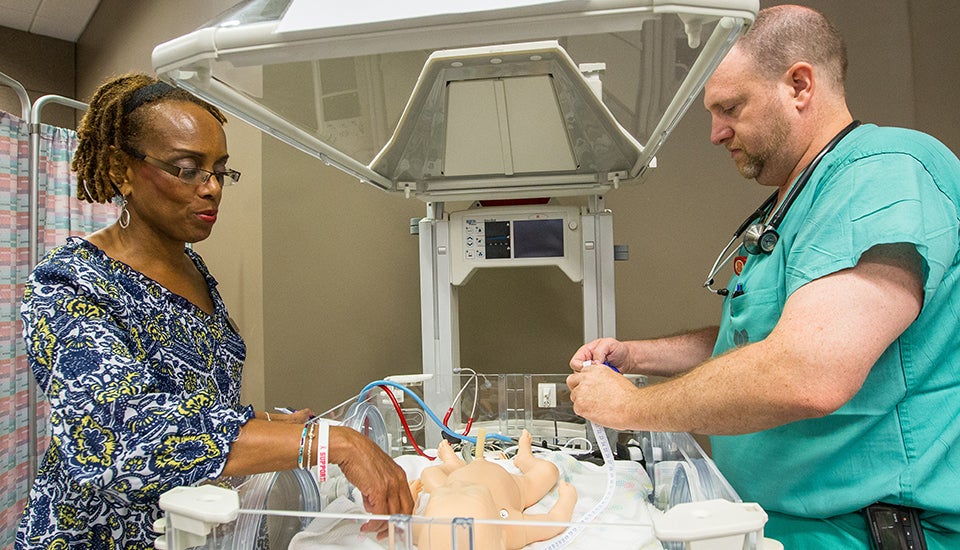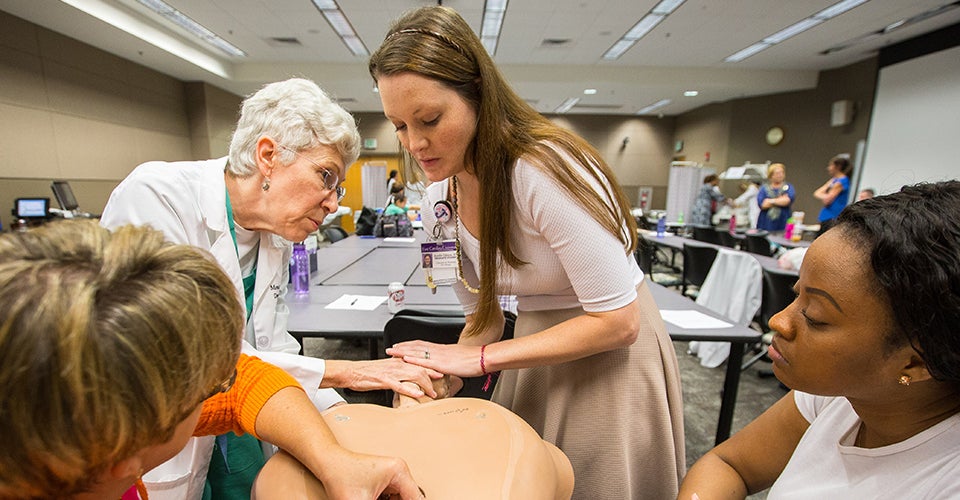‘CONFIDENCE BUILDER’
Nursing students train for real-world situations
As the fall semester began, distance education students in East Carolina University’s master of science in nursing program gathered on campus for several days of hands-on training designed to prepare them for a variety of situations they will encounter working in the health care system.
The first set of exercises involved nursing students in the midwifery and neonatal nurse practitioner (NNP) concentrations, who collaborated in role-playing scenarios in which they explained procedures or delivered bad news to patients. One station involved a translator and a couple that didn’t speak English, while another focused on the risks involved in a pre-term delivery.
“The true benefit of this exercise is the collaboration, teamwork and communication,” said Dr. Amy Jnah, director of the neonatal nurse practitioner concentration in the College of Nursing. “It offers students the opportunity to apply their knowledge in simulated clinical scenarios involving counseling of laboring women or families of critically-ill infants. This allows the students to self-assess strengths and weaknesses, and fill any recognized knowledge-practice gaps before participating as a team leader after graduation.”
For the first time this year, students in the midwifery concentration were included in the role-playing exercises, creating collaboration across disciplines similar to what would happen in a real delivery setting. Translators from the local health department and drama students were brought in to lend realism to the simulations.
“Communication is so important in health care,” said Kim Fleming, a student in the midwifery program. “You have to make sure to give all the information in an accurate and compassionate way, and knowing that you’ve done it before, that you have that script in your back pocket, is a great confidence builder.”

Graduate student Cassandra Elder, RN, practices neonatal assessment.
Fleming, like the rest of the students in the program, is working on her master’s degree while already working as a nurse; she’s a labor and delivery nurse at a high-risk facility. She said she became a nurse so that she could be a midwife, out of a desire to “help people through these difficult transitions. Birth is hard even though it’s beautiful,” she said.
Rebecca Moretto, who is in her last year of the midwifery program, said, “There is research that shows that simulations like these really do improve outcomes. Between these groups of professionals there are some gaps in communication. So this helps close that gap and keep everybody safe.”
Moretto also said she has benefited from the other students’ experiences and perspectives. “We’re all coming from different disciplines,” she said. “My background is in low-risk deliveries, so I’ve been able to learn from Kim, who has experience in high-risk situations.”
The students will soon be working with patients during clinicals, so it’s important to prepare them for what they will face, said Dr. Becky Bagley, director of the midwifery concentration. “In these exercises they’re outlining what will happen and why to help make the patient more comfortable.
“These simulations have been successful with the NNP program, and they asked us to join in with our midwifery students. We’re learning together, and practicing together, and we make a great team,” she said.
Shannon Moore’s MSN in the NNP program will be her third degree from ECU. “It was so nice to see how all the pieces of a patient’s experience come together as they flow through the health care system,” she said.
“I had the opportunity to see the midwives doing what they do best (as far as providing care for a pregnant mother), and then actually experience the passing of the baton to us as NNPs, for us to take over in our role of providing excellent care for the infant,” Moore continued. “I could actually feel the support from the midwives in our simulations as we delivered bad news to the parent about their infant – support not only for the mother, but also support and backing for the NNP. It truly felt like a team.”
The midwifery students also worked with interns from the obstetrician program at the Brody School of Medicine, as well as Brody and nursing faculty, to practice labor and delivery skills. The simulations included breaking a mother’s water, placing a fetal scalp electrode, birthing a baby using a manikin and infant, and performing a pudendal block, a method of delivering anesthetic.

Dr. Keith Nelson of the Brody School of Medicine explains the placement of a pudendal block, a technique for delivering anesthetic.
“We’re practicing basic hand maneuvers during delivery, and they’ve done really well,” said Monica Newby, assistant clinical professor in the Brody School of Medicine, who ran one of the simulation stations. “Some of them hadn’t seen these alternative birthing positions and different ways to give birth, so it just puts the idea in their mind and gives them something to think about.”
Fleming said the exercises provided a lot of information at one time, but that the practice helped build confidence. “It’s a little daunting knowing that we’ll be doing this with real people who are scared and screaming,” she said, “but it’s good to start building that muscle memory and technique.”
The simulations give the faculty a chance to critique and correct the students’ technique, Bagley said. “If they make a mistake it’s here in a safe environment.”
Finally, the midwifery students participated in a mini business institute where they learned from both business school faculty and midwifery faculty about developing a business plan for a midwifery practice.
“It is important for practicing nurse-midwives to employ sound business practices in order to continue to maintain financially viable clinical practices, regardless of whether they are employees or administrators of their own offices,” said Dr. Connie Dewees, clinical assistant professor of nurse-midwifery. “Today’s changing health care industry requires that midwives be both expert clinicians and knowledgeable business persons.”
These hands-on exercises are part of what makes ECU’s online MSN program one of the strongest in the nation; the U.S. News & World Report has consistently ranked it among the top programs. With 46 students, the neonatal nurse practitioner program is one of the five largest in the U.S., Jnah said. The nurse-midwifery concentration is the only program of its kind in the Carolinas. It has 39 students and recently received 10 years of accreditation, the maximum granted by the Accreditation Commission for Midwifery Education.
“I think this is one of the best things we can do to help the students prepare for real-life situations,” said Sonya Hardin, College of Nursing associate dean for graduate programs.

Dr. Pamela Reis, assistant professor in the College of Nursing, and John Bailey work at the neonatal assessment station.
